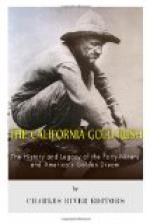The machinery of this early civic life was very crude. Even the fire department, which was by far the most efficient, was, as has been indicated, more occupied with politics, rivalry, and fun, than with its proper function. The plank roads were good as long as they remained unworn, but they soon showed many holes, large and small, jagged, splintered, ugly holes going down into the depths of the mud. Many of these had been mended by private philanthropists; many more had been labeled with facetious signboards. There were rough sketches of accidents taken from life, and various legends such as “Head of Navigation,” “No bottom,” “Horse and dray lost here,” “Take sounding,” “Storage room, inquire below,” “Good fishing for teal,” and the like. As for the government, the less said about that the better. Responsibility was still in embryo; but politics and the law, as an irritant, were highly esteemed. The elections of the times were a farce and a holiday; nobody knew whom he was voting for nor what he was shouting for, but he voted as often and shouted as loud as he could. Every American citizen was entitled to a vote, and every one, no matter from what part of the world he came, claimed to be an American citizen and defied any one to prove the contrary. Proof consisted of club, sling-shot, bowie, and pistol. A grand free fight was a refreshment to the soul. After “a pleasant time by all was had,” the populace settled down and forgot all about the officers whom it had elected. The latter went their own sweet way, unless admonished by spasmodic mass-meetings that some particularly unscrupulous raid on the treasury was noted and resented. Most of the revenue was made by the sale of city lots. Scrip was issued in payment of debt. This bore interest sometimes at the rate of six or eight per cent a month.
In the meantime, the rest of the crowd went about its own affairs. Then, as now, the American citizen is willing to pay a very high price in dishonesty to be left free for his own pressing affairs. That does not mean that he is himself either dishonest or indifferent. When the price suddenly becomes too high, either because of the increase in dishonesty or the decrease in value of his own time, he suddenly refuses to pay. This happened not infrequently in the early days of California.
CHAPTER XI
THE VIGILANTES OF ’51
In 1851 the price for one commodity became too high. That commodity was lawlessness.
In two years the population of the city had vastly increased, until it now numbered over thirty thousand inhabitants. At an equal or greater pace the criminal and lawless elements had also increased. The confessedly criminal immigrants were paroled convicts from Sydney and other criminal colonies. These practiced men were augmented by the weak and desperate from other countries. Mexico, especially, was strongly represented. At first few in numbers




